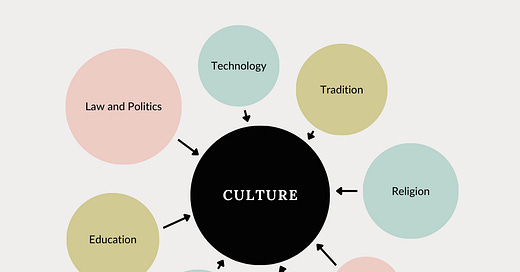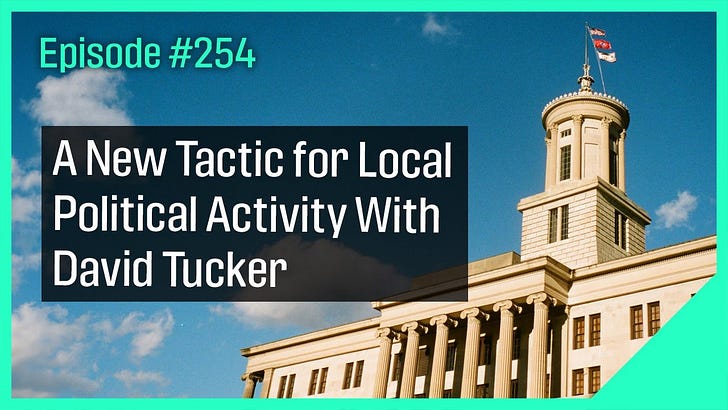Politics Isn't Downstream of Culture, Part 2
Our essay a few weeks ago by this name generated quite a bit of feedback and some excellent discussion. If you missed it, you can read it here:
In case it isn’t obvious, this is an important topic in our line of work. If culture is actually upstream of politics, and cultural change leads inexorably to political change, then TFI is kind of a meaningless organization. Why waste time fighting in the political realm to change a law or kill legislation, when the political sphere of today will be shortly subsumed by the cultural waters of tomorrow? We’re a sad, quixotic bunch, tilting at windmills in a futile pursuit. We should all quit our jobs and start making movies, preaching the gospel, or educating the next generation.
If a picture is worth a thousand words, a graph might be worth three hundred. So let’s try one on for size:
This is how we understand culture. It’s not upstream of politics, law, religion, education, or anything else. Rather, it’s a blend of all those things. The Oxford Dictionary defines culture as the “customs, arts, social institutions, and achievements of a particular nation, people, or social group; the behavior and characteristics of a particular social group.” If culture is simply how people behave, in the aggregate, then culture is affected by things as innocuous as weather or geography, as well as available vocations and technological innovation.
Culture is also affected by the more obvious players of law, religion, and education. Governments, denominations, and academia make moral declarations of all sorts, which affect culture when people either conform, ignore, or rebel against those declarations. Davis Hunt pointed out in the Pamphleteer that law creates the boundaries of acceptable behavior, and is therefore upstream culture, noting that the Second Amendment has created attitudes and rituals around gun ownership in the US. While this is an excellent observation, we could also note that the ninth and tenth amendments, in the exact same founding document, have been trampled upon and almost entirely ignored. With a few negative court rulings (and arguably, a civil war), cultural ideas of limited federal government and true states’ rights were effectively crushed. Law only creates the bounds of a culture when other pieces of the cultural milieu coalesce into a cohesive boundary around that law. In other words, modern gun culture in the US may be protected by the Second Amendment, but it was created by the internet.
Cultural factors affect one another like this all the time. A law bans a substance based on the cultural consensus that it’s bad for you (marijuana), and then technology advances to circumvent the law (extracting THC) while media, alternative medicine, and criminal reform groups work to change consensus around its use. Eventually the law will be overturned. In other categories, climate and geographical culture may be made obsolete by technology (air conditioning is a great example of this), while mass education might affect religion (common people reading scripture in their own tongue and learning what the Bible actually says is arguably the foundation of the protestant Reformation). Media affects technological progress (think sci-fi movies), and technology affects media (internet, anyone?). A culture’s traditions affect all of these arenas, and once affected, the “new” quickly becomes the “traditional”.
If culture is how a group of people behaves, then it quickly becomes obvious that anything which affects behavior affects culture. It’s possible to affect people’s behavior through reason, religion, education, or coercion. It can happen because of ecological factors, population growth, wealth increase or decrease, emigration and immigration, or a host of other factors.
The point, made as simply as possible, is: People change each other. There is a great circularity and interplay that happens as people think, talk, and act toward one another and in society. As they argue, reason, fight, coerce, encourage, and tell stories to one other, culture changes.
So what’s the point?
The point is, we shouldn’t neglect anything. No civic engagement should be forgotten, no cultural opportunity ignored. Focusing on any one aspect to the detriment of the others will result in a stunted culture.
Civic engagement requires all of us. Some should write books, make movies, and create news. Some should educate and help with the development of children and young people to shape the worldview of the next generation. Some should pour their hearts into ministry and religious pursuits to remind us that there are bigger spiritual realities at work than what we can see. Some should develop new technology so we can deal more effectively with human problems. And some should work in law and politics to create bounds for power and ensure that justice is done.
And all of us should work heartily at whatever our hand finds to do, and love our neighbor as we love ourselves.
Huh. That sounds like something we’ve heard before.




